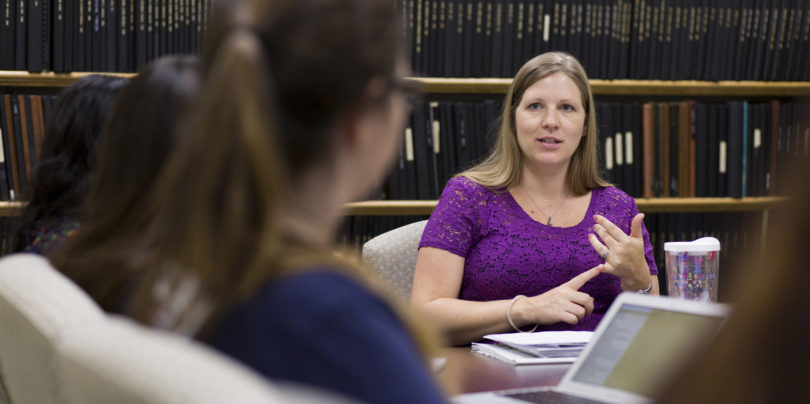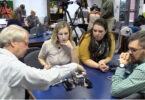Ashley Johnson Harrison, an assistant professor in the College of Education, teaches future school psychologists about autism spectrum disorders and is working with UGA’s Disability Resource Center to promote learning strategies for students diagnosed with ASD.
Where did you earn degrees and what are your current responsibilities at UGA?
I received my Bachelor of Science degree in neurobiology from the University of Texas in Austin and a Ph.D. in clinical psychology from Binghamton University in upstate New York. I am currently a tenure-track assistant professor in the school psychology area of emphasis in the department of educational psychology in the College of Education.
When did you come to UGA and what brought you here?
The 2014-2015 academic year was my first at UGA. The decision to come to UGA was easy for me. I was initially drawn in by the strength of the educational psychology department, as evidenced by high program rankings and a publication in the Journal of School Psychology reporting the high research productivity of the school psychology program (Kranzler et al., 2011). The fact that Athens is such a zesty small town along with the warmth and camaraderie of the faculty and students in educational psychology further won me over. I am also excited about the growing presence of autism researchers in the UGA College of Education.
What are your favorite courses and why?
My passion is working with children with autism, so I love teaching a graduate-level seminar on autism spectrum disorders (EPSY 8120) where we discuss early identification and diagnosis, etiological theories, treatment approaches, special education eligibility and instructional techniques.
What interests you about your field?
As a highly social person myself, I am fascinated by the social impairment that defines autism spectrum disorders. My research in social attention tries to understand and identify what is at the root of this social disconnect and at what point in children’s development this occurs.
What are some highlights of your career at UGA?
I had a really exciting first year. I published multiple manuscripts, including an article detailing the cross-cultural assessment work I conduct in Tanzania (Harrison et al., 2014 — Intellectual and Developmental Disabilities). I also was invited to present on this topic at the Muhimbili University of Health and Allied Sciences pediatric grand rounds in Dar Es Salaam, Tanzania. As a result of this work, I was awarded an Early Career Award by the Association of Behavioral and Cognitive Therapies Autism Spectrum/Developmental Disabilities Special Interest Group and received a pilot grant from the UGA Owens Institute for Behavioral Research to continue this work. I also was awarded the 2014-2015 University of Georgia Disability Resource Center’s Outstanding Faculty of the Year award for my work with students with autism and other disabilities on campus.
How does your research or scholarship inspire your teaching, and vice versa?
I am always thinking of ways to intersect research, teaching and service. I would love to offer more research studies that have a large component of intervention so that I can build student supervision into these studies and expand clinical training for our school psychology doctoral students and students in other clinical and professional programs on campus as well as serve an important need in the community.
What do you hope students gain from their classroom experience with you?
Regardless of the topic on which I am instructing, I always emphasize the importance of cross-cultural competency because of the work I have been conducting internationally. I hope my students can take some of the practical examples I provide and apply them to their own clinical practice.
Describe your ideal student.
I look for students that are creative and willing to think outside of the box. I think the ideal student is one who is hungry to learn, is collaborative and is excited about supervision and feedback.
Favorite place to be/thing to do on campus is…
My favorite place on campus is actually my lab. I love our weekly lab meetings—each one makes me excited about teaching and my job.
Beyond the UGA campus, I like to…
I have been really impressed by the vibrant music scene in Athens and love to catch a local show whenever I can.
Community/civic involvement includes….
I have been trying to integrate myself in the Athens and Atlanta autism community so that I can do my part to help more families obtain the clinical services they need. I have joined the Georgia Autism Advisory Council to help progress autism services in our state and hope to get involved in more local activities.
Favorite book/movie (and why)?
There are so many. My all-time favorite book is “The World According to Garp” by John Irving. I read this book as I backpacked around Europe in college, so it reminds me of the trip that instilled my love of travel and inspired some of the international work I conduct today. Also, I am an Irving fan in general.
Proudest moment at UGA?
I felt honored to receive an award from the Disability Resource Center during the annual reception for its scholarship recipients. Listening to the stories of these students overcoming monumental life challenges to arrive at UGA was awe-inspiring and made me excited to be part of such a supportive university community.
Is there anything else you’d like to add?
I would like to take a moment to remember a student in my lab who passed away last year, Brianna Cochran. She was a wonderful person and I will forever be thankful for having had the opportunity to mentor her.
(Originally published Sept. 13, 2015)








